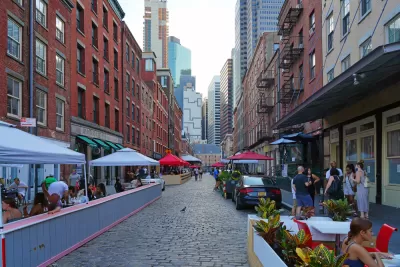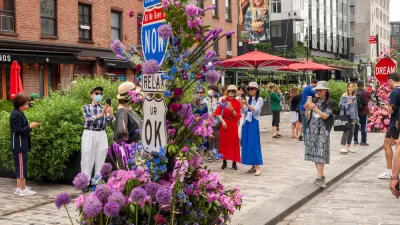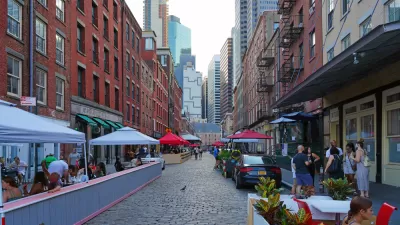The effort to reclaim public and private spaces from car storage had some setbacks since the days of al fresco and open streets in the first years of Covid-19. But widespread parking reforms and new evidence shows the public is rethinking parking.

The empty streets and suffering business that defined the early months of the Covid-19 pandemic also prompted a fresh look at the public realm, inspiring many cities and communities to reclaim and transform some of the spaces previously reserved for automobile storage into spaces for other activities, such as play, dining, and exercise.
The programs that recovered parking spaces for more active, human uses retreated, to a degree, in the ensuing months and years: while some cities have made outdoor dining programs and parklets permanent, others have reopened streets to cars, rescinded permitting programs, and dialed back ambitions for a post-parking future.
Oliver Moore, writing for the Globe and Mail, makes the case that despite these setbacks for the cause, "the broader pattern is a gradual dismantling of the decades-long assumption that more parking is inherently better." Moore points to the parking reforms underway in Canadian cities, first in Edmonton, followed by more than a dozen other cities as support for the argument (the parking reform trend is also obvious in the United States).
"Perhaps the biggest recent shift in attitudes around parking has been the recognition of just how much value may be forgone by using desirable urban real estate as car storage," writes Moore. A recent report assigns financial value to the choice between parking or other uses of urban space.
Researchers for an association of local business improvement areas estimated that customers spent $181-million in the repurposed parking spaces in the summer of 2021. The same spaces would have generated $3.7-million in parking revenue, according to the local parking authority, and even that modest figure assumed prepandemic levels of demand.
Moore's conclusion, with more examples and and appeals to authority, included in the source article (which requires an email to read for free): people are slowly waking up to the idea that parking doesn't play the same role in cities as it did in the 1950s.
FULL STORY: New spin on parking spaces during pandemic reaps benefits

Alabama: Trump Terminates Settlements for Black Communities Harmed By Raw Sewage
Trump deemed the landmark civil rights agreement “illegal DEI and environmental justice policy.”

Study: Maui’s Plan to Convert Vacation Rentals to Long-Term Housing Could Cause Nearly $1 Billion Economic Loss
The plan would reduce visitor accommodation by 25% resulting in 1,900 jobs lost.

Why Should We Subsidize Public Transportation?
Many public transit agencies face financial stress due to rising costs, declining fare revenue, and declining subsidies. Transit advocates must provide a strong business case for increasing public transit funding.

Paris Bike Boom Leads to Steep Drop in Air Pollution
The French city’s air quality has improved dramatically in the past 20 years, coinciding with a growth in cycling.

Why Housing Costs More to Build in California Than in Texas
Hard costs like labor and materials combined with ‘soft’ costs such as permitting make building in the San Francisco Bay Area almost three times as costly as in Texas cities.

San Diego County Sees a Rise in Urban Coyotes
San Diego County experiences a rise in urban coyotes, as sightings become prevalent throughout its urban neighbourhoods and surrounding areas.
Urban Design for Planners 1: Software Tools
This six-course series explores essential urban design concepts using open source software and equips planners with the tools they need to participate fully in the urban design process.
Planning for Universal Design
Learn the tools for implementing Universal Design in planning regulations.
Smith Gee Studio
Alamo Area Metropolitan Planning Organization
City of Santa Clarita
Institute for Housing and Urban Development Studies (IHS)
City of Grandview
Harvard GSD Executive Education
Toledo-Lucas County Plan Commissions
Salt Lake City
NYU Wagner Graduate School of Public Service





























